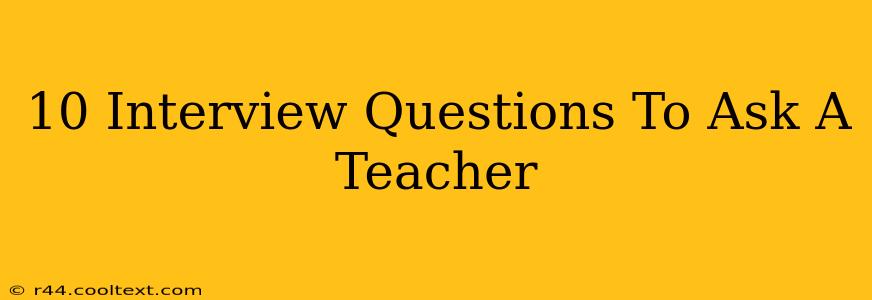Finding the right teacher for your child or for your school is a crucial decision. A well-structured interview can significantly aid this process. This article provides ten insightful interview questions to ask a prospective teacher, designed to reveal their teaching philosophy, classroom management style, and commitment to student success. These questions go beyond the typical resume review, delving into the heart of their pedagogical approach. Use this guide to find the perfect educator for your needs.
Understanding Their Teaching Philosophy
1. Describe your teaching philosophy. What are your core beliefs about how children learn best? This open-ended question allows the teacher to articulate their approach to education. Look for answers that demonstrate a deep understanding of child development and varied learning styles. Keywords to listen for include differentiated instruction, student-centered learning, inquiry-based learning, and collaborative learning.
2. How do you adapt your teaching methods to meet the diverse needs of students in your classroom? Every classroom is unique. A strong teacher understands this and can articulate how they cater to different learning styles, abilities, and cultural backgrounds. Expect answers that highlight individualized learning plans (ILPs), accommodations for students with special needs, and strategies for engaging all learners.
Classroom Management and Engagement
3. Describe your classroom management style. How do you create a positive and productive learning environment? Classroom management is vital. Listen for responses that detail proactive strategies, positive reinforcement techniques, and clear expectations. Avoid teachers who rely solely on punitive measures.
4. How do you engage students who are struggling or disengaged in the learning process? A teacher’s ability to re-engage struggling students speaks volumes. Effective strategies might include individualized support, differentiated instruction, and fostering a sense of belonging and accomplishment.
Assessment and Feedback
5. How do you assess student learning and provide feedback? Assessment is more than just tests. A good teacher uses a variety of assessment methods, including formative and summative assessments, to understand student progress and provide constructive feedback. Look for answers that mention frequent check-ins, personalized feedback, and opportunities for student self-assessment.
Collaboration and Communication
6. How do you communicate with parents and guardians? Open communication is essential. The ideal candidate will describe a proactive approach to communication, including regular updates, parent-teacher conferences, and easy accessibility.
7. How do you collaborate with other teachers and school staff? Effective teachers are team players. Look for answers demonstrating a willingness to collaborate on curriculum development, share best practices, and contribute to a positive school environment. Keywords like professional learning communities (PLCs) are positive indicators.
Professional Development and Growth
8. How do you stay current with the latest research and best practices in education? The field of education is constantly evolving. A commitment to professional development shows a dedication to continuous improvement.
Passion and Commitment
9. What aspects of teaching are you most passionate about? Passion is contagious. A teacher's enthusiasm can significantly impact student learning.
10. Why are you interested in this specific teaching position? This question reveals their motivations and understanding of the school and its students. It also indicates how well-aligned they are with the specific role and the school's mission.
By asking these ten insightful questions, you can gain valuable insights into a prospective teacher’s capabilities and suitability for the position. Remember to follow up on their answers with further probing questions to gain a deeper understanding of their approach to education. This will help ensure you find the best possible educator for your child or school.

